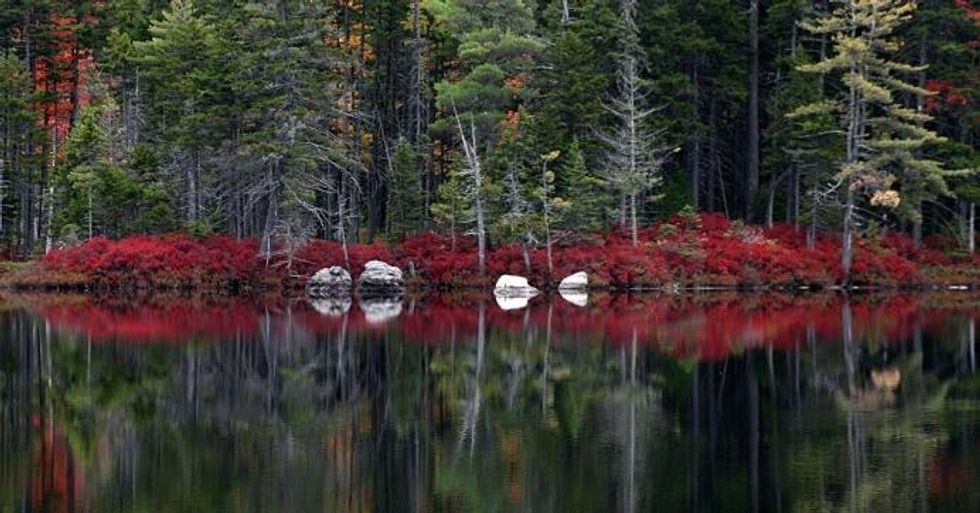

SUBSCRIBE TO OUR FREE NEWSLETTER
Daily news & progressive opinion—funded by the people, not the corporations—delivered straight to your inbox.
5
#000000
#FFFFFF
To donate by check, phone, or other method, see our More Ways to Give page.


Daily news & progressive opinion—funded by the people, not the corporations—delivered straight to your inbox.

The Mojave Trails National Monument. (Photo: Bob Wick/Bureau of Land Management/flickr/cc)
With the public comment period ending Monday, there are just hours left for the public to weigh in on President Donald Trump's order that threatens protections of 27 national monuments designated since 1996.
"These monuments were protected by presidents from both parties for good reason," said Randi Spivak, director of the Center for Biological Diversity's public lands program. "Their natural beauty and scientific and cultural importance is indisputable, but Trump and his corporate friends claim to know better. Sadly it's just their greed talking."
Trump's executive order, issued in April, called for Interior Secretary Ryan Zinke to conduct a review of designations or expansions made by the last three presidents using executive powers under the Antiquities Act of every monument larger than 100,00 acres "or where the Secretary determines that the designation or expansion was made without adequate public outreach and coordination with relevant stakeholders."

The order suggested that the review could open the possibility of fossil fuel drilling. It states: "Monument designations that result from a lack of public outreach and proper coordination with State, tribal, and local officials and other relevant stakeholders may also create barriers to achieving energy independence, restrict public access to and use of Federal lands, burden State, tribal, and local governments, and otherwise curtail economic growth."
As such, Lukas Ross, climate and energy campaigner with Friends of the Earth, warned: "In his first hundred days in office Trump is determined to turn our public lands and waters into energy sacrifice zones."
According to Zinke (who's earned a 4 percent lifetime score from the League of Conservation Voters), the review of the designations is to see if they should be "rescinded, resized, or modified in order to better benefit our public lands."
Opposition has poured in since the review was announced.
As of this writing over 1.3 million comments have been submitted. And in a letter sent in may to Trump, Zinke, and Commerce Secretary Wilbur Ross, 450 diverse organizations representing millions of people wrote to express their concern, stating that they "view an attack on any one national monument as an attack on them all."

To submit a comment online, go to regulations.gov and search DOI-2017-0002.
Dear Common Dreams reader, The U.S. is on a fast track to authoritarianism like nothing I've ever seen. Meanwhile, corporate news outlets are utterly capitulating to Trump, twisting their coverage to avoid drawing his ire while lining up to stuff cash in his pockets. That's why I believe that Common Dreams is doing the best and most consequential reporting that we've ever done. Our small but mighty team is a progressive reporting powerhouse, covering the news every day that the corporate media never will. Our mission has always been simple: To inform. To inspire. And to ignite change for the common good. Now here's the key piece that I want all our readers to understand: None of this would be possible without your financial support. That's not just some fundraising cliche. It's the absolute and literal truth. We don't accept corporate advertising and never will. We don't have a paywall because we don't think people should be blocked from critical news based on their ability to pay. Everything we do is funded by the donations of readers like you. Will you donate now to help power the nonprofit, independent reporting of Common Dreams? Thank you for being a vital member of our community. Together, we can keep independent journalism alive when it’s needed most. - Craig Brown, Co-founder |
With the public comment period ending Monday, there are just hours left for the public to weigh in on President Donald Trump's order that threatens protections of 27 national monuments designated since 1996.
"These monuments were protected by presidents from both parties for good reason," said Randi Spivak, director of the Center for Biological Diversity's public lands program. "Their natural beauty and scientific and cultural importance is indisputable, but Trump and his corporate friends claim to know better. Sadly it's just their greed talking."
Trump's executive order, issued in April, called for Interior Secretary Ryan Zinke to conduct a review of designations or expansions made by the last three presidents using executive powers under the Antiquities Act of every monument larger than 100,00 acres "or where the Secretary determines that the designation or expansion was made without adequate public outreach and coordination with relevant stakeholders."

The order suggested that the review could open the possibility of fossil fuel drilling. It states: "Monument designations that result from a lack of public outreach and proper coordination with State, tribal, and local officials and other relevant stakeholders may also create barriers to achieving energy independence, restrict public access to and use of Federal lands, burden State, tribal, and local governments, and otherwise curtail economic growth."
As such, Lukas Ross, climate and energy campaigner with Friends of the Earth, warned: "In his first hundred days in office Trump is determined to turn our public lands and waters into energy sacrifice zones."
According to Zinke (who's earned a 4 percent lifetime score from the League of Conservation Voters), the review of the designations is to see if they should be "rescinded, resized, or modified in order to better benefit our public lands."
Opposition has poured in since the review was announced.
As of this writing over 1.3 million comments have been submitted. And in a letter sent in may to Trump, Zinke, and Commerce Secretary Wilbur Ross, 450 diverse organizations representing millions of people wrote to express their concern, stating that they "view an attack on any one national monument as an attack on them all."

To submit a comment online, go to regulations.gov and search DOI-2017-0002.
With the public comment period ending Monday, there are just hours left for the public to weigh in on President Donald Trump's order that threatens protections of 27 national monuments designated since 1996.
"These monuments were protected by presidents from both parties for good reason," said Randi Spivak, director of the Center for Biological Diversity's public lands program. "Their natural beauty and scientific and cultural importance is indisputable, but Trump and his corporate friends claim to know better. Sadly it's just their greed talking."
Trump's executive order, issued in April, called for Interior Secretary Ryan Zinke to conduct a review of designations or expansions made by the last three presidents using executive powers under the Antiquities Act of every monument larger than 100,00 acres "or where the Secretary determines that the designation or expansion was made without adequate public outreach and coordination with relevant stakeholders."

The order suggested that the review could open the possibility of fossil fuel drilling. It states: "Monument designations that result from a lack of public outreach and proper coordination with State, tribal, and local officials and other relevant stakeholders may also create barriers to achieving energy independence, restrict public access to and use of Federal lands, burden State, tribal, and local governments, and otherwise curtail economic growth."
As such, Lukas Ross, climate and energy campaigner with Friends of the Earth, warned: "In his first hundred days in office Trump is determined to turn our public lands and waters into energy sacrifice zones."
According to Zinke (who's earned a 4 percent lifetime score from the League of Conservation Voters), the review of the designations is to see if they should be "rescinded, resized, or modified in order to better benefit our public lands."
Opposition has poured in since the review was announced.
As of this writing over 1.3 million comments have been submitted. And in a letter sent in may to Trump, Zinke, and Commerce Secretary Wilbur Ross, 450 diverse organizations representing millions of people wrote to express their concern, stating that they "view an attack on any one national monument as an attack on them all."

To submit a comment online, go to regulations.gov and search DOI-2017-0002.